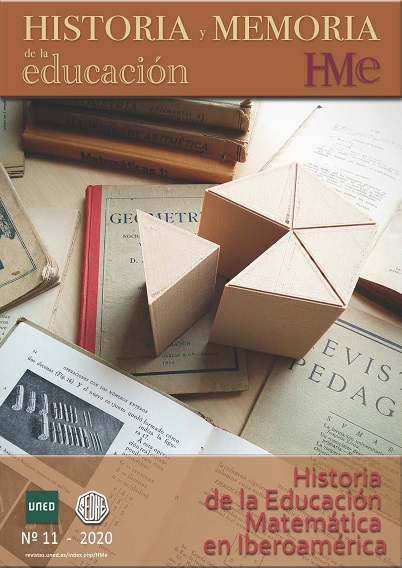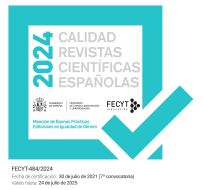Mutis y la introducción del método analítico en Colombia
DOI:
https://doi.org/10.5944/hme.11.2020.23959Parole chiave:
Historia de la educación matemática, Enseñanza del método analítico, José Celestino Mutis, Historia del Colegio del Rosario de BogotáAbstract
En este trabajo se estudian las distintas modalidades de enseñanza del método analítico por José Celestino Mutis (1732-1808) en la cátedra de matemáticas del Colegio del Rosario de Bogotá durante la segunda mitad del siglo XVIII. Como marco de referencia para apreciar mejor las ransformaciones de esta enseñanza, se empezará por recordar algunas de las características históricas y filosóficas más importantes de la distinción cartesiana entre análisis y síntesis en el pensamiento matemático. Mutis empieza introduciendo el enfoque logicista del Discurso del Método de Wolff. Luego explica las reglas cartesianas del análisis y la síntesis, para lo cual traduce fragmentos de los Comentarios a la geometría de Descartes de Rabuel. También presenta las ideas de Newton sobre el método analítico, tanto en la modalidad experimental de la Óptica como en la perspectiva físico-matemática de los Principia. Se analizará el esfuerzo que pudo haber significado la comprensión de este cambio de perspectiva en el proceso de lectura y traducción de los Principia por parte de Mutis. Enseguida se muestra que al centrarse la enseñanza en los Elementos de Matemáticas de Bails —como consecuencia de la reforma del plan de estudios de la cátedra promovida por Mutis—, se termina adoptando la modalidad operatoria del análisis como aplicación del álgebra a la geometría. Finalmente se muestra que la introducción del texto de Bails conllevó una transformación de fondo en el enfoque epistemológico, cognitivo y pedagógico de la enseñanza por el método analítico en la cátedra del Rosario, comparada con los Elementa Matheseos Universae de Wolff en su etapa fundacional.
Downloads
Riferimenti bibliografici
Arboleda, Luis Carlos. «Newton en Nueva Granada. Anticartesianismo y matematización de la realidad en la traducción mutisiana de los Principia». En Mutis y la Real Expedición Botánica del Nuevo Reino de Granada, editado por María del Pilar San Pío Alarden, 33-47. Barcelona: Villegas/Lunwerg Editores, 1992.
Arboleda, Luis Carlos. «Matemáticas, Cultura y Sociedad en Colombia». En Historia Social de la Ciencia en Colombia, editado por Emilio Quevedo, tomo II, 13-172. Bogotá: Colciencias, 1993.
Arboleda, Luis Carlos. «El análisis cartesiano en la solución del problema de Pappus y la introducción de las curvas algebraicas». En Asociación Colombiana de Matemática Educativa 13º Encuentro, editado por Gilberto Obando Zapata, 764-776. Medellín: Editorial Universidad de Medellín, 2013.
Arboleda, Luis Carlos. «La introducción del método analítico en la enseñanza de las matemáticas en Colombia». Revista Paradigma 39 (2018): 202-222.
Bails, Benito. Elementos de Matemática. 10 vols. Madrid: Joachim Ibarra, 1772-1783.
Bails, Bails. Principios de Matemática. 3 vols. Madrid: Vda. de Ibarra, 1776.
Cantù, Paola. «Mathematics. Systematical Concepts». En Handbuch Christian Wolff, editado por Robert Theis y Alexander Aichele, 357-380. Wiesbaden: Springer, 2018.
Cohen, I. Bernard. La revolución newtoniana y la transformación de las ideas científicas. Madrid: Alianza, 1983.
Crépel, Pierre y Christophe Schmit (eds.). Autour de Descartes et Newton. Le paysage scientifique lyonnais dans le premier XVIIIe siècle. Paris: Hermann, 2017.
Descartes, René. The Geometry of René Descartes with a facsimile of the first edition. Translated from the French and Latin by David Eugene Smith and Marcia L. Lattan. New York: Dover, 1954.
Gardies, Jean-Louis. Qu’est-ce que et pourquoi l’analyse? Essai de définition. Paris: Vrin, 2001.
González de Posada, Francisco. José Celestino Mutis, médico, y la ciencia fundamental de su tiempo en España. Santander: Real Academia de Medicina de Cantabria, 2008.
Hilbert, David. The Foundations of Geometry. Authorized translation by E. J. Townsend. Reprint edition. La Salle: The Open Court Publishing Co., 1950.
Hintikka, Jaakko y Unto Remes. The Method of Analysis. Its Geometrical Origin and Its General Significance. Dordrecht: Reidel, 1974.
Humboldt, Alexander von. «Mutis Don Joseph Celestino». En Biographie Universelle Ancienne et Moderne, editado por Michaud, nouvelle édition, vol. 29: 658-662. Paris: Desplaces, 1823.
Klein, Jacob. Greek Mathematical Thought and the Origin of Algebra. New York: Dover, 1968.
La Caille, Nicolas-Louis de. Leçons Élémentaires de Mathématiques ou Élémens d’Algebre et de Géométrie. Paris: Guerin, 1747.
Leseur, Thomas y François Jacquier. Philosophiae naturalis principia mathematica auctore Isaaco Newtono eq aurato: perpetuis commentaris illustrate. Genevae: Barrillot, 1739-1742.
Maronne, Sébastien. «Les Commentaires sur la Géométrie de M. Descartes (1730) de Claude Rabuel». En Autour de Descartes et Newton. Le paysage scientifique lyonnais dans le premier XVIIIe siècle, editado por Pierre Crépel y Christophe Schmit, 111-161 y 349-355 (Annexe). Paris: Hermann, 2017.
Molina, Sebastián. «Aspectos metodológicos de la demostración de la fuerza en los Principia de Newton». Praxis Filosófica 39 (2014): 67-92.
Molina, Sebastián. «“No hay reino que no sea newtoniano”: José Celestino Mutis and the appropriation of Newton’s experimental physics in New Granada (1762-1804)». PhD diss., Università degli Studi di Torino, 2018.
Mutis, José Celestino. Pensamiento científico y filosófico de José Celestino Mutis. Editado por Gonzalo Hernández de Alba. Bogotá: Fondo Cultural Cafetero, 1982.
Newton, Isaac. Opticks, or, A Treatise of the Reflections, Refractions, Inflections, and Colours of Light. New York: Prometheus Books, 2003.
Otte, Michael y Marco Panza (eds.). Analysis and Synthesis in Mathematics. Dordrecht: Kluwer, 1997.
Pombo, Lino de. Lecciones de jeometría analítica. Bogotá: Imprenta El día, 1850.
Quevedo, Emilio. «Mutis y la medicina». En Mutis y la Real Expedición Botánica del Nuevo Reino de Granada, editado por María del Pilar San Pío Alarden, 77-97. Barcelona: Villegas/Lunwerg Editores, 1992.
Rabuel, Claude. Commentaires sur la géométrie de M. Descartes. Lyon: M. Duplain, 1730.
Wolff, Christian. Elementa matheseos universae. Qui commentationem de methodo mathematica, arithmeticam, geometriam, trigonometriam planam, et analysin tam finitorum, quam infinitorum complectitur. 2 vols. Halle: Magdeburgicae, 1713-1715.
Wolff, Christian. Cours de mathématique contenant toutes les parties de cette science mises à la portée des commençants, traduit en françois e augmenté considérablement, 3 tomes. Paris: Jombert, 1757.
Wolfii, Christiani [Christian Wolff]. Elementa matheseos universae. Editio novissima, multo auctior et Correctior, 5 tomos. Genevae: Henricum-Albertum Gosse, 1743-1752.
##submission.downloads##
Pubblicato
Come citare
Fascicolo
Sezione
Licenza
Authors who publish in Historia y Memoria de la Educación agree to the following terms:
- Authors retain copyright and grant the journal right of first publication with the work simultaneously licensed under a Creative Commons Attribution-NonCommercial 4.0 International that allows others to share the work with an acknowledgement of the work's authorship and initial publication in this journal.
- Authors are able to enter into separate, additional contractual arrangements for the non-exclusive distribution of the journal's published version of the work (e.g., post it to an institutional repository or publish it in a book), with an acknowledgement of its initial publication in this journal.
- Authors are permitted and encouraged to post their work online (e.g., in institutional repositories or on their website) prior to and during the submission process, as it can lead to productive exchanges, as well as earlier and greater citation of published work (See The Effect of Open Access).









